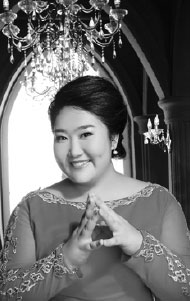

Behind every successful Chinese pianist, there's always a devoted parent. Such mothers and fathers are role models to people who dream of their children becoming star musicians someday. But obviously, only children with an interest in the piano and ample talent will make it to the top.
What's common to Lang Lang, Wang Yuja, Zhang Haochen and Li Yundi? Yes, they all play the piano. But more importantly, they've all loved the instrument since early childhood with an intensity that they didn't feel even for toys back then. As kids they might have taken a break from being around the piano if they got bored, but they would return to it by themselves.
On that list is Tian Jiaxin, another rising pianist, who was born to a composer father and soprano mother in Beijing in 1986. But her parents did not want her to start a career in music until she entered college.
"At the very beginning, they did not allow me to play the piano. You know, I was born in a family where there was a lot of music. When I was 3, my happiest moment would be to see my father playing the piano while my mother sang," Tian tells China Daily while sitting in a dressing room of the National Center for the Performing Arts last week. "I really wanted to learn the instrument. But they always said no."
"Later they (her parents) told me that it would be a road without a U-turn. They said, I should think carefully whether I really wanted to do it. They kept saying that until I was 20. I was too young to understand it and just insisted on learning. They finally sent me to a piano professor at the China Central Conservatory."
Last Friday evening, the 28-year-old played a piano concerto titled the Chinese Dream with the China National Symphony Orchestra under the baton of Hu Yongyan.
Because of her parents' different approach, Tian's early years were perhaps different from other young pianists such as Lang Lang and Wang Yuja, both of whom went to primary and middle schools attached to the conservatory and went to study music in the West at a fairly young age.
In the meantime, Tian took a road similar to many other Beijing kids and topped her school.

She played the piano for about two or three hours a day after school and then did her homework after 9 pm.
"I gradually understood my parents' words. While being a pianist was a good dream with great risk, solid basic knowledge on all subjects could give me more choices and lead me to more possibilities in the future," she says.
The final decision came in 2006, when she had to choose an institution for her higher studies. Following a long family discussion, she picked Shenyang Conservatory where she was taught by Wei Danwen, one of the last students of Russian-born American pianist Vladimir Samoylovich Horowitz (1903-89).
In 2010, she won a fellowship to Manhattan School of Music under the guidance of pianist Jeffrey Cohen.
In New York, Tian first lived in the house of one of her parents' friends.
"It's lonely in a foreign country and I felt great pressure at the Manhattan School of Music. But thanks to my open mind and straightforward personality, I tried to be optimistic," she says. "Music is magic. It is not a language but beyond any language barrier. I soon made many friends by playing the piano."
The host family loved the young pianist so much that they allowed her to stay for two years.
Her musical breakthrough came in 2011, when she won the Manhattan School of Music's Dora Zaslavsky Koch Competition. Her performance of Mozart's Piano Concerto in D minor, K 466 impressed the French conductor and pianist Philippe Entremont, who later invited her to play a concert with the school's symphony orchestra at the John C. Borden Auditorium in Manhattan School of Music.
In September, Tian became a Steinway Artist, joining a list of some of the best pianists in the world including Lang Lang and Wang Yujia.
In the past three years, Tian has performed widely in the United States, Germany, France and the Czech Republic.
"I enjoy playing concerts. The bigger the venue and the larger the audience, I feel better," she says. "Whenever I play a piece of music, I would imagine a movie scene in my head and try to convey the story to the audience."
chenjie@chinadaily.com.cn